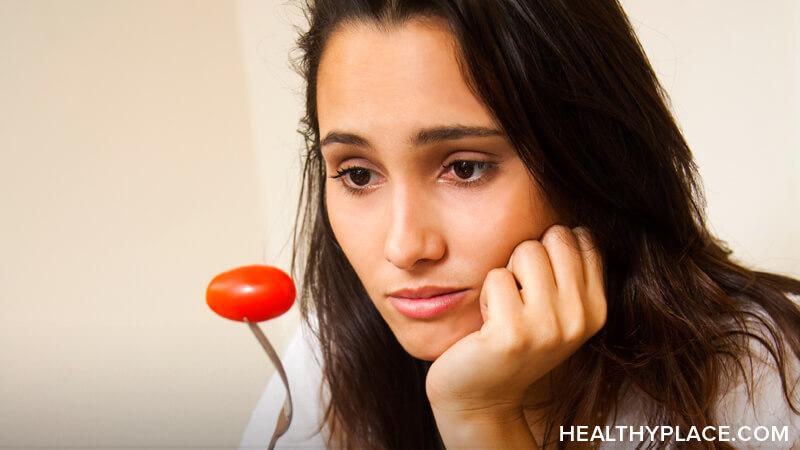How I Cope When Anxiety Negates My Appetite

Anxiety can negate your appetite. Anxiety and eating disorders often co-occur—that's hardly a shock to those who live with the harsh realities and ramifications of both illnesses. As the National Institute of Mental Health reveals, 65.1 percent of those with binge eating disorder, 47.9 percent with anorexia, and 80.6 percent with bulimia meet the diagnostic criteria for anxiety.1
But despite how common this co-occurrence is, there's no one-size-fits-all reaction to being in the throes of anxiety. Some feel an impulse to "stress eat," while others find it painful to eat. I fall into the latter category, but I'm also aware that I need nourishment to function—especially when anxious thoughts and emotions threaten to overwhelm me. So how do I cope when anxiety negates my appetite? As with all facets of recovery, it's a work in progress.
How the Impacts of Anxiety Often Take Away My Appetite
Yesterday was the mid-term election in the United States. Although I voted by mail a few weeks ago, I was incredibly anxious about the results, telling myself I should have been more proactive to ensure the outcome I wanted—as if my singular actions could control all the variables of an election. While I continuously refreshed the news tab on my computer screen to check the latest batch of polling information, I could feel my stomach muscles heave with tension. It had been hours since my last meal (coffee and a piece of fruit), but the sheer thought of food was nauseating. Anxiety had taken over in both the mental and physical sense.
In contentious times like this, I have no trouble justifying caloric restriction. It seems rational—or even natural—to skip a meal. "My digestive tract is under too much pressure right now," I reason. "Why stress it out more? Fasting will calm the discomfort."
But I also have enough experience in eating disorder recovery to know that small rationalizations of a certain behavior (no matter how harmless it might seem) can lead to a full-blown eating disorder relapse. Anxiety often does wreak havoc on my stomach and intestines, but that is no excuse to deprive myself of nutrients. So here's how I am learning to cope when anxiety negates my appetite.
My Strategies to Cope When Anxiety Negates My Appetite
Regardless of how anxious I feel, it's not an option to slide back into my former patterns of eating disorder behavior. This is the commitment I have made to myself, and almost nothing matters more on my list of priorities than healing and freedom from the mental illness that once consumed me. But since I can't just snap my fingers and banish all traces of anxiety, I need an action plan to stand firm in recovery. That means nourishing myself when it would be more comfortable—and so much easier—to continue subsisting on an empty stomach. Below are a few practical strategies I use to cope when anxiety negates my appetite.
- I take deep, conscious breaths. When I focus on each slow inhale from my diaphragm and exhale through my mouth, this repetitive motion will help relax the tense contractions in my stomach, which alleviates the feeling of nausea.
- I choose easy-to-swallow foods. In those moments when I know it's beneficial to eat, but I legitimately feel too squeamish for an entire meal, I resort to drinking my nutrients. I blend spinach, berries, avocado, cashew milk, and peanut butter into a healthy, filling smoothie that doesn't require much effort or strain to ingest.
- I distract myself while I'm eating. Most of the time, I practice mindful eating (the intuitive awareness of pleasure and satiation during a meal), but when anxiety hits, I need a positive distraction. In these instances, I'll read a book chapter, watch a funny TV show, work on a crossword puzzle, or listen to a podcast as I eat.
- I repeat a soothing affirmation. Anxiety thrives on "what-ifs," so I have a mantra that helps me combat anxious feelings with the concrete truth: "This sensation will pass. It has no hold on me. I can return to calm, peace, and balance."
Do you wrestle with anxiety and an eating disorder at the same time? Is it difficult for you to eat when anxious thoughts or emotions rise to the surface? How do you cope when anxiety negates your appetite? Feel free to share your insights in the comment section.
Source
- Eating Disorders: Co-Morbidity with Other Mental Disorders in Adults. National Institute of Mental Health. Retrieved November 8, 2022, https://www.nimh.nih.gov/health/statistics/eating-disorders#part_2571
APA Reference
Schurrer, M.
(2022, November 9). How I Cope When Anxiety Negates My Appetite , HealthyPlace. Retrieved
on 2026, January 16 from https://www.healthyplace.com/blogs/survivinged/2022/11/how-i-cope-when-anxiety-negates-my-appetite